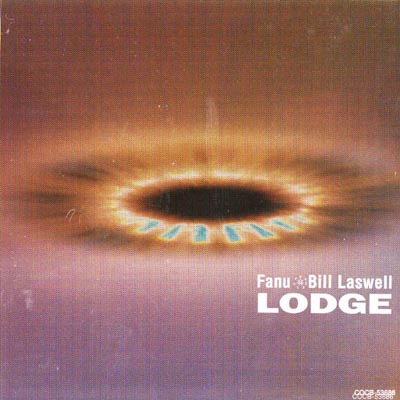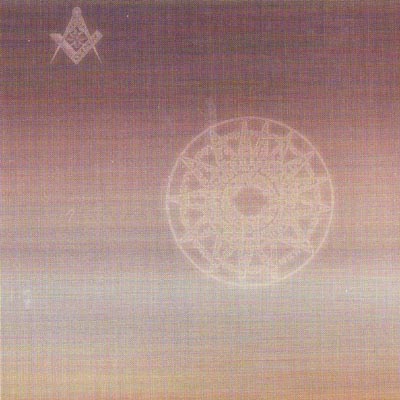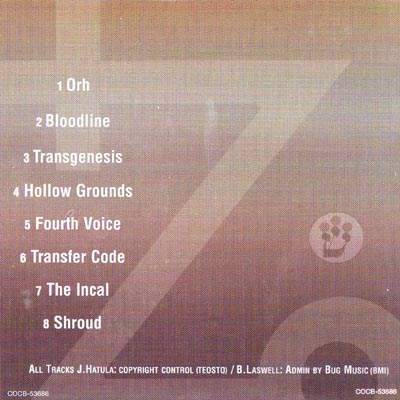BILL LASWELL + FANU






1/ Orh (Laswell,Hatula) 5.46
2/ Bloodline (Laswell,Hatula) 5.34
3/ Transgenesis (Laswell,Hatula) 4.45
4/ Hollow Grounds (Laswell,Hatula) 4.51
5/ Fourth Voice (Laswell,Hatula) 5.33
6/ Transfercode (Laswell,Hatula) 6.30
7/ The Incal (Laswell,Hatula) 7.31
8/ Shroud (Laswell,Hatula) 4.25
Created at Orange Music, Orange, New Jersey and Fanu Music Studio
Engineer: Robert Musso
Assistant Engineer: James Dellatacoma
Produced and arranged by Bill Laswell
Art Work + Design: John Brown @ Cloud Chamber
Mastered by Michael Fossenkemper at Turtle Tone Studio, NYC
Bill Laswell: electric bass, sounds; Fanu: beats; Bernie Worell: keyboards; Nils Petter Molvaer: trumpet; Graham Haynes: cornet.
2007 - Nagual Records/Columbia Records (Japan), COCB-53686 (CD)
2008 - OHM Resistance (USA), 8M OHM (CD)
2008 - Karl Records (Germany), KR 004 (CD)
While these meetings have been wild, speedy and, to snatch a word from one title, doggone brutal, the present session with Finnish wunderkind Fanu is crisp, fresh and reminiscent more of work Laswell did a decade ago with the artists of the now-defunct Brooklyn crew he helped finance, WordSound. About his take on drum´n´bass, Fanu (real name Janne Hatula) has stated that his long love of the genre has him "creating today´s drum and bass with the aesthetics that come from [that] past."
Thus what we have here are two veterans of the genre meeting for the first time and hopefully pushing at the proverbial envelope. But Lodge is also a record of another tradition, a kind of jazz-funk record. In tow to the sessions Laswell has three experts - Parliament/Funkadelic keyboardist Bernie Worrell and trumpeters Nils Petter Molvær and Graham Haynes. NPM himself is known for his own groundbreaking cross-genre jazz/d´n´b albums, while Haynes boasts not only an impressive solo career but has also accompanied Laswell on many of his more adventurous expeditions.
Which is not to say that compared with this starting line-up, Fanu has little to bring to the table - he goes ape already on the second track, "Bloodline" and later on "Transfer Code". At calmer times, one or two tracks sound as though they were recorded during Laswell´s "Dub Chamber" sessions, but that doesn´t make it any less welcome. Bill´s bass takes centrestage on the closer,"Shroud", a virtuoso narrative surrounded by swirling keys and hammered at by Fanu´s insistent snare.
Taken as a whole, Lodge is not a spectacular breakthrough but rather a deftly arranged and coherent piece of work by two very compatible artists. Hope to hear more of Fanu in Laswell´s future work - or Laswell in Fanu´s.
Stephen Fruitman (courtesy of the Sonomu website)
Too often, drum n bass fails to excite the imagination or ignite much personality. Sure, it makes for great club music, a terrific sort of aural wallpaper. But rarely, if ever, does anyone stop and ask, “hey, who (or what) is that?” Lodge tends to suffer much the same fate, but with a few notable exceptions. A collaboration between DJ/samplist Fanu and bassist/producer/impresario Bill Laswell, Lodge enlists several top-tier players that have experience in a wide range of musical palettes to give this music far more personality than it usually has. Norwegian trumpet player Nils Petter Molvaer and cornetist Graham Haynes show up here and there to lend a Miles-ian touch to the proceedings, giving Lodge a welcome sort of jazz edge (both Molvaer and Haynes also appear on Laswell’s great dub album with Jah Wobble, Radioaxiom, lending it the same levity they provide here). Bernie Worrell contributes keyboards throughout, playing what sounds like clavinet and electric piano on “Orh” (where Worrell seems to quote David Byrne’s “Dinosaur”) and “Shroud,” clavinet and synthesizers on “Bloodline,” electric piano on “Transgenesis,” synthesizer on “Hollow Ground,” organ and electric piano on “Transfer Code” and a bit of everything on “Fourth Voice.” Worrell’s keyboards color the textures and, as expected, never dominate. He improvises a little on “Transfer Code.” But blink and you just might miss it. Both “Fourth Way” and “Shroud” top the list of the disc’s most interesting moments. The two Pangea-era pieces also prominently feature Worrell’s maddeningly restrained yet always fascinating commentary even though neither of the trumpeters figure on “Shroud” nor do any guitarists. Still, while it’s a pleasure to hear Bernie Worrell mix it up in the jungle, it’s the connection back to Miles’ stunningly progressive 1970s work (brought to the proceedings, no doubt, by Bill Laswell) that make Lodge really stand out.
Doug Payne (courtesy of the Sound Insights website)